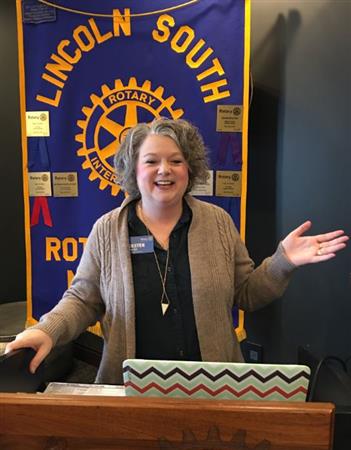January is National Mentoring Month and we had the opportunity to hear about Heartland Big Brothers Big Sisters from Executive Director Kiersten Hill on Friday January 5.
The mission of the Heartland Big Brothers Big Sisters program:
We provide children facing adversity with strong and enduring, professionally supported one-to-one relationships that change their lives for the better, forever.
Kiersten pointed out a few words from the mission:
Enduring - she shared that the relationships are often long-term; they currently have a match that has been in place for 11 years.
Professionally supported - the Big Brothers Bib Sisters staff supports all of the relationships from regular interviews with all parties to problem-solving.
The Big Brothers Big Sisters program has been around for 50 years, starting in 1970 as a program at the YMCA called YPals. They became independent in 1996.
It is the oldest, largest, most effective and most studied youth mentoring program in the United States. They have compiled statistics on all aspects and impacts of the program over a number of years.
Looking at some of the facts and statistics, Kiersten shared:
76% of the "Littles" are from non-traditional or single parent households
84% of the "Littles" are from low-income homes
60% of the "Littles" are femail
70% of the "Littles" on the waiting list are male
The opportunity to spend time with their "Bigs" is often the only time when a "Little" gets attention - it is all about them.
Those interested in being a mentor should know of the great support that they will receive.
The sign up program includes an introduction and orientation. The first introduction between the "Big" and the "Little" is coordinated by (and includes) Big Brothers Big Sisters staff. After the first solo meeting, the staff interviews the "Big", the "Little" and the family of the "Little" to ensure it was comfortable. After a few weekly follow-up interviews, they change to monthly. The staff is always there to ensure all parties are satisfied with the relationship.
Kiersten closed her presentation with a few more statistics:
1 of 3 young people are growing up without a mentor - they don't have any one to look up to
Those with mentors:
52% less likely to skip school
55% more likely to enroll in college
46% less likely to use drugs
78% more likely to volunteer regularly
130% more likely to hold a leadership position in a club
90% said they would like to become a mentor
These "littles" are future Rotarians.
